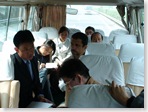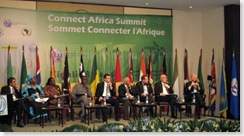Beyond Travel
It has been over a week since I returned from my trip to Helsinki, which makes it three out of the last five weeks that I have been on the road outside of  the US. While I was in Finland, some of my colleagues in the Unlimited Potential Group were scattered to other parts of the globe. Orlando Ayala and Debby Fry Wilson were in China where they met with partners, helped open a community technology center, and even adopted a panda (as part of a environmental sponsorship program). Michael Rawding --who runs our Partners, Products, and Solutions team -- was in Rwanda, Kenya, and Nigeria. He spoke at the Connect Africa
the US. While I was in Finland, some of my colleagues in the Unlimited Potential Group were scattered to other parts of the globe. Orlando Ayala and Debby Fry Wilson were in China where they met with partners, helped open a community technology center, and even adopted a panda (as part of a environmental sponsorship program). Michael Rawding --who runs our Partners, Products, and Solutions team -- was in Rwanda, Kenya, and Nigeria. He spoke at the Connect Africa  Summit in Kigali and then met with local leaders in the other two countries. National Public Radio in the US ran a piece on the conference. Craig Bruya, who recently joined the UPG team to run strategy for us, was in South Africa meeting with a partner. Will Poole was actually at home last week but leaves Seattle today for a flight to Macau.
Summit in Kigali and then met with local leaders in the other two countries. National Public Radio in the US ran a piece on the conference. Craig Bruya, who recently joined the UPG team to run strategy for us, was in South Africa meeting with a partner. Will Poole was actually at home last week but leaves Seattle today for a flight to Macau.
So the casual reader of this blog might reach the conclusion that all that these Microsoft people do is jet around the world, attend conferences, and cut ribbons at opening ceremonies for community computing centers. At times I must confess that I feel like a highly paid travel writer.
But there is a method to our madness.
As I mentioned in my opening post, Unlimited Potential is actually a product group that is incubating new technologies targeting the needs of people in the middle and bottom of the economic pyramid. We have sales and technical people in the field who work directly with our partners (including governments and NGOs, by the way) on technology trials and incubations, and we have R&D people in Redmond, India, and China who develop the new technologies and solutions that go into the pilot programs in the field. These two groups work under a single management team to streamline the feedback and decision-making process.
Our goal is straightforward -- developing technology for the next 5 billion people -- and we are guided by a core set of requirements that have emerged for the middle and bottom of the pyramid (which we call MOP and BOP, by the way): Relevant (the technology needs to be useful to people within the context of their daily life); Accessible (it needs to be delivered to where they live); and Affordable (they -- or someone -- can pay for it.)
It is important to understand that our field trials are testing business models as much as they are testing new products and solutions. In almost every case, these new business models involve working with local partners and entrepreneurs. Traditional software industry licensing models -- and pricing levels, for that matter -- may not work in many of these segments. There is an assumption in some circles that the only alternative to this is a "free" open source model, but open source has its own issues in terms of helping bootstrap local technology economies, which we believe is a requirement for success in this mission. And one of the things we are hearing, especially from our experiences in Africa, is that a straight, aid-based model may not be the best way for countries to improve their economies at a national level. Sustained development requires the creation of local businesses, and helping create opportunity for local businesses is something Microsoft likes to do.
When you hear people talk about "new models where business meets philanthropy", this is what they are talking about.
The actual technologies and solutions we are developing cross a broad spectrum, ranging from policy-level programs like the work we are doing with Telecentre.org to hardcore engineering device-specific software development, including the porting of Windows and Office to the emerging class of low cost flash-memory based PCs that are proving to be popular in education scenarios. And we have developed an internal planning tool we call the "Innovation Lifecycle" that we use to gauge the progress of these business model/new technology pairings as they advance through their incubation trials. Many of these projects will never reach broad scale deployment and adoption, and we are consciously trying to avoid the type of hype cycle that characterizes the way the technology industry (including Microsoft!) typically markets products.
So the point of this post is to let you know that there is a lot more going on in UPG beyond travel. We learn so much when we are on the road, the stories almost seem to write themselves. And these solutions we are developing will not be built in a vacuum, we need to work with partners. But for every exec we have out on the road, we have about 40 people back at home doing (real) work. And that is the only way we are going to achieve the outcomes that we want to achieve, by trying to strike the right balance between listening and working.